Mozilla VPN Review
Mozilla VPN is a VPN product that launched in 2020 and shows a lot of promise, even at this early stage. Though it offers little in the way of advanced features, it covers the essentials well, as you can read in our Mozilla VPN review.
The Mozilla corporation has long been at the forefront of creating innovative products that make the internet experience better for all users. Its signature product — the Mozilla Firefox browser — is simple and intuitive and one of the fastest web browsers available. So, when Mozilla announced it was making a stand-alone VPN, we were excited to do a Mozilla VPN review.
Key Takeaways:
- Coming from the makers of the popular Firefox browser, Mozilla VPN offers secure browsing, but lacks advanced features.
- You can use Mozilla VPN on all devices, including Android, iOS, Windows, Mac and Linux.
- Mozilla VPN uses WireGuard protocol and ChaCha20 encryption to create a secure VPN tunnel.
- Mozilla VPN is currently available in a limited range of countries, but there are already 33 on the list, with plans to continue adding more.
Mozilla rolled out the service in beta in 2019 as “Firefox Private Network.” After a year of beta testing and tweaking, “Mozilla VPN” entered the fray in July 2020 as a full-service VPN for Windows, Android, iOS, macOS and Linux devices. At the time of publishing, Mozilla VPN is available to users in 33 countries.
When we tested Mozilla VPN, two things came out clearly. First, the VPN isn’t quite there yet and doesn’t deliver a stellar enough performance to claim a spot in our best VPN providers list. Second, Mozilla VPN has massive potential and is a product to keep a close eye on. Keep reading our full Mozilla VPN review for all the nitty-gritty.
- 1
- : PayPal, Credit card, Google Pay, JCB, UnionPay, Bitcoin, Ethereum, X-Coin
- : 10
- :
- :
- :
- :
Average speedDownload Speed87 MbpsUpload Speed9 MbpsLatency3 ms - 2
- : PayPal, Credit card, Google Pay, Amazon Pay
- : Unlimited
- :
- :
- :
- :
Average speedDownload Speed93 MbpsUpload Speed9 MbpsLatency3 ms - 3
- : PayPal, Credit card, Bitcoin, UnionPay, iDeal, Sofort, Giropay, Pixpay, Sepa Direct Debit
- : 8
- :
- :
- :
- :
Average speedDownload Speed90 MbpsUpload Speed9 MbpsLatency3 ms - 4
- : PayPal, Credit card
- : 5
- :
- :
- :
- :
- 5
- : PayPal, Credit card, bitcoin, Amazon Pay
- : 7
- :
- :
- :
- :
Average speed
-
07/29/2024 Facts checked
Added new features including multi-hop, ad-block and Firefox Tabs integration, listed the Cure53 audit, updated the number of servers and corrected misinformation about California privacy law.
Strengths & Weaknesses
Pros:
- Integrates with Firefox
- Pretty fast servers
- Reasonably priced
- Automatic kill switch
- WireGuard protocol
- 30-day money-back guarantee
Cons:
- Limited configuration options
- No split tunneling on macOS
- Can’t unblock BBC iPlayer or Amazon Prime Video
- Not available in all countries
Features
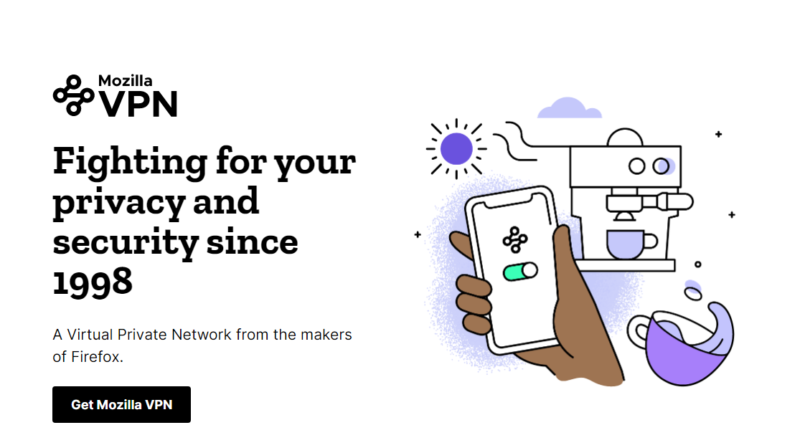
Mozilla VPN is only a few years out of the beta testing stage, and as you’d expect, it’s still a work in progress in terms of its feature set. It doesn’t offer the range of options you get from competitors such as NordVPN and Surfshark. However, all its essential features embody the excellent quality Mozilla is known for.
Protect Your Privacy. Get Our Free VPN Guide Now!
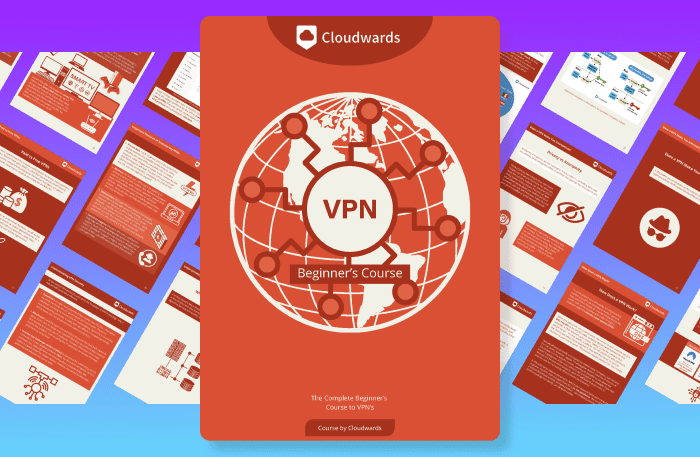
- Comprehend the essential role a VPN plays in safeguarding your digital life
- Gain a deep understanding of how VPNs function under the hood
- Develop the ability to distinguish fact from fiction in VPN promotions
We were pleased that Mozilla covers the entire spectrum of operating systems. One quibble, though, is that the VPN is currently compatible with only the latest versions of Windows 10 (64-bit only), macOS (10.15 and up), iOS (13.0 and up) and Android (version 6 and up). On Linux, it works only on Ubuntu, sidelining all other distros — though it should still work on most Ubuntu-derivatives.
Split Tunneling
Mozilla VPN allows split tunneling. In principle, split tunneling lets you divide your internet traffic and route some apps through the VPN, while letting other apps use an unprotected network. This lets you use things like banking apps, which you can’t use with a VPN. Plus, it lets you game using your connection’s full speed while using a VPN for streaming on your browser.
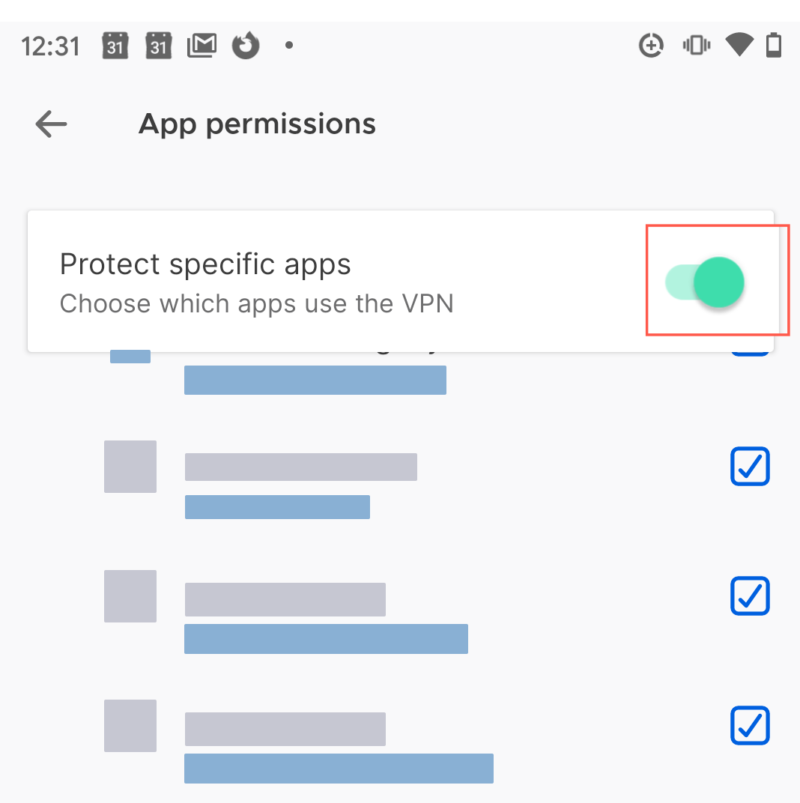
Mozilla VPN provides the split tunneling feature to Windows, Android and Linux users. The feature is easy to use and entails simply tapping or ticking specific apps. “App permissions” is an allowlist that lets you mark the only apps you want to go through the VPN tunnel. “App exclusions” is a blocklist on which you can pick apps to go outside the VPN.
Kill Switch
A kill switch is another indispensable feature, and we’re glad Mozilla VPN makes it available on all apps. Generally, a kill switch springs into action when your VPN connection drops. It blocks your device’s network connection, preventing your internet service provider or hackers from seeing your data like an actual IP address.
The Mozilla VPN kill switch comes enabled by default on Android, iOS, Windows, Mac and Linux apps, and there is no option to switch it off. There is also no setting to tweak how the kill switch functions, which is unusual. That aside, Mozilla VPN’s kill switch worked well.
Other Features
Mozilla VPN comes with a content blocker that automatically intercepts ad trackers, preventing ads from loading and keeping advertisers from building profiles on you. Its malware blocker also prevents you from browsing to URLs known to be compromised.
The app has also added a multi-hop VPN feature that lets you connect through two servers instead of one. If one server goes down or springs a leak, you’ll still be protected by the other.
Finally, there’s a Firefox integration called Multi-Account Containers. If you add this extension to your Firefox browser, you can have multiple tabs connected to different VPN servers — so you can stream foreign content in one tab while browsing at better speeds in another. It’s a rare and incredibly useful perk.
Mozilla VPN Features Overview
| Features | |
|---|---|
| Payment methods | Credit card |
| Accepts cryptocurrency | |
| Simultaneous connections | 5 |
| Supports split tunneling | on Android devices |
| Unlimited bandwidth | |
| Free trial available | |
| Refund period | |
| Worldwide server amount | 280 server in 31 countries |
| Desktop OSes | Windows, MacOS, Linux |
| Mobile OSes | Android, iOS |
| Browser extensions | Firefox |
| Can be installed on routers | |
| Can access Netflix US | |
| Can access BBC iPlayer | |
| Can access Hulu | |
| Can access Amazon Prime Video | |
| Encryption types | Chacha20 |
| VPN protocols available | WireGuard |
| Enabled at device startup | |
| Allows torrenting | |
| No-logging policy | |
| Passed DNS leak test | |
| Killswitch available | |
| Malware/ad blocker included | |
| Live Chat | |
| Email support | 24/7 |
| Phone support | |
| User forum | |
| Knowledgebase |
Pricing
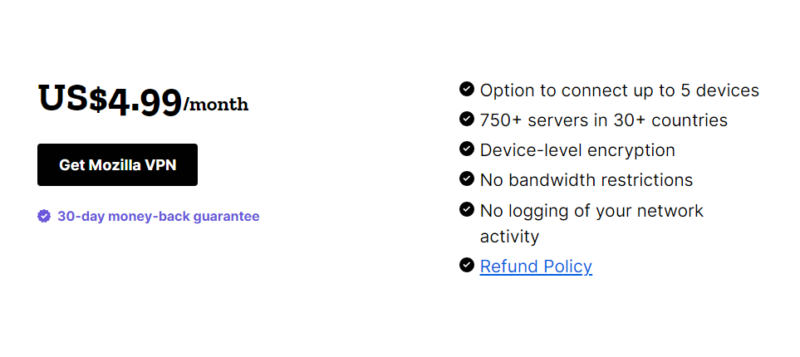
Mozilla VPN costs $4.99 per month, with no annual or multi-year plans. We like the simplicity and the straightforwardness of the pricing “structure” (if you can call it that), but that’s the only thing that’s good about it. There is no free plan, so if you’re interested in a no-cost VPN, be sure to check our best free VPN services instead.
Mozilla VPN isn’t the cheapest VPN we have reviewed, either. Other products such as CyberGhost are more affordable (read our CyberGhost review to learn more). Besides, with no long-term plans, you’ll have to make monthly payments, which can be a hassle for some people.
Value for Money
For the price, you get unlimited bandwidth, which is a nice touch for a VPN that only entered the fray a few months ago. Even better, you can connect up to five devices on a single account. Again, this isn’t the best in the market, especially in an era when VPNs such as Surfshark offer unlimited simultaneous device connections. Read our Surfshark review to learn more.
Though Mozilla VPN allows you to connect up to five devices, there is a slight deviation from the norm. Instead of limiting you by the number of simultaneous connections, it limits you by the number of registered devices.
A registered device refers to a device signed into your Firefox account via Mozilla VPN app. If you hit the limit, you’ll have to remove one of the registered devices to sign in a new one, which makes account sharing a bit of a pain.
Mozilla VPN’s Money-Back Guarantee
Mozilla VPN offers a 30-day money-back guarantee, which allows you to try the service risk-free. It means that if you subscribe to the service and for any reason you’re unimpressed, you can cancel the subscription within 30 days and claim a refund.
To claim a refund, head over to the Window client and open the “settings” menu. Scroll down and select the “get help” option. Click “contact us” and fill out the form — make sure to enter “refund request” in the subject field and explain the reason for canceling. Mozilla claims to refund your money in five to 10 business days.
User-Friendliness
As we mentioned earlier, Mozilla VPN doesn’t offer much in the way of complex features. For this reason, we went into this Mozilla VPN review expecting the VPN service to be a cinch to use. The VPN served up evidence of its simplicity right from the start.
Its website is as user-friendly as they get, providing every detail you need to know about Mozilla VPN clearly and concisely. To get started, we first created a Firefox account, which required nothing more than providing an email address and age.
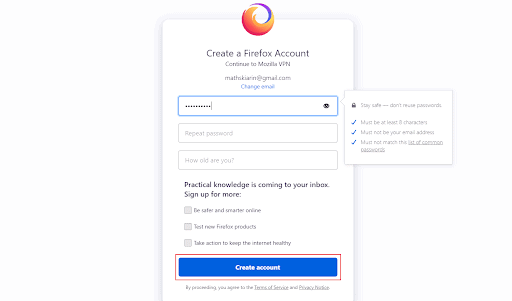
To finish our account creation, we set up the billing information and paid for the subscription. Once we got everything done, Mozilla pointed us to the VPN download page. It took us only a few minutes to download and install the app on our device.
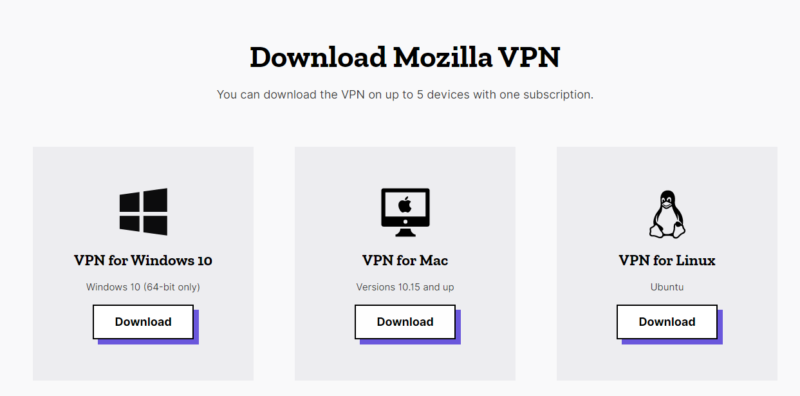
Mozilla VPN’s Windows Client
The first thing you notice when you open the Windows app is the clean and intuitive interface. Mozilla VPN’s interface is modern and minimalistic, with everything you need and nothing you don’t. There is an on/off toggle button, an option to select your preferred location and another to manage your registered devices.
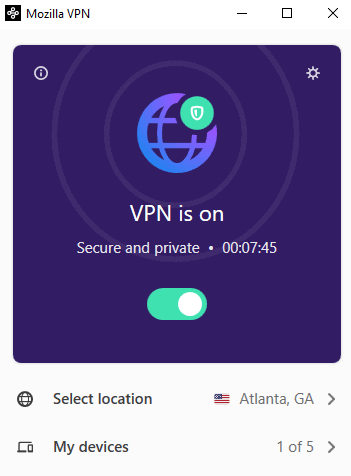
When you click “select location” below the client’s main area, you’ll find a list of 31 countries. You can drill down and pick a specific server in your country of choice.
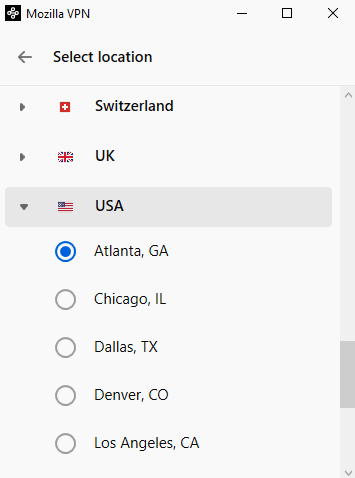
Connecting to your location of choice is as easy as clicking the toggle button, which lights up green once the VPN establishes the connection.
We commend Mozilla VPN for making everything pretty easy for anyone new to virtual private networks. Its simple interface allows you to set the VPN and get onto the web with minimal fuss.
That said, there are some quality-of-life features that are sorely missing. Mozilla VPN doesn’t come with a search box to quickly find a preferred location or a “favorites” section to display your most commonly used locations. Not to mention, it doesn’t offer an option to find the fastest server based on your location.
Windows Client Settings
The Windows client has two options that we found to be helpful. The first option is the small icon on the Windows client’s top left, where you get details about your IP address and connection speeds.
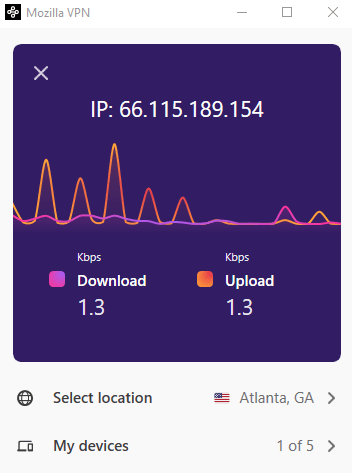
Next, when you click on the gear icon in the Windows client’s top-right corner, you get a list of options to tweak how the VPN works. However, most Mozilla VPN functions are automatic by default, so you won’t get many opportunities to tinker with this service.
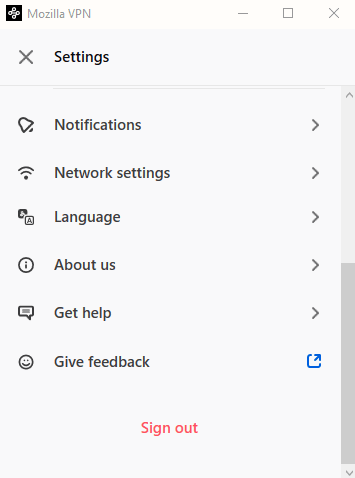
Under the “notifications” settings, you can choose to receive a notification when a guest WiFi portal is blocked or when you connect to unsecured WiFi.
There is limited control over the technical features as well. You have the option to enable IPv6, which provides better security and improved speed compared to IPv4. Keep in mind that Mozilla VPN uses Mullvad servers (read our Mullvad review), which use IPv4 to communicate with the client by default.
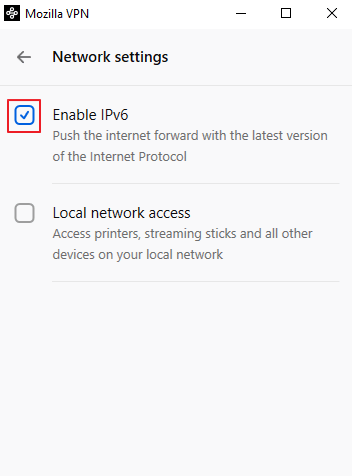
Moreover, you get an option to enable access to local devices. This option is beneficial if you want to let your computer interact with streaming sticks, printers and other devices on your local network while keeping your remote connection secure.
Beyond these configuration options, your hands are tied. You can’t change the VPN protocol because Mozilla VPN supports only WireGuard (more about this in the security section). Keeping the settings to a bare minimum is great for newbies but is a put-off for seasoned users who want more control over how the VPN works.
Android and iOS Apps
The Android app’s interface is near-identical to that of the Windows client, and the design similarity is music to the ears of VPN newbies. It means that once you get the hang of using the Windows client, you’ll have an easy time using the iOS and Android apps. One big difference between the Windows client and Android app is the split tunneling feature, which isn’t available on desktop.
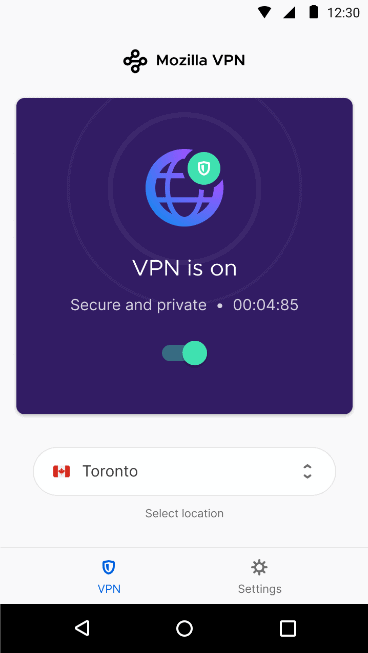
Speed
As we mentioned in the last section, Mozilla VPN uses Mullvad servers, and we found in our previous Mullvad VPN testing that all of the servers have decent speed. Knowing this, we expected Mozilla VPN speed test results to mirror the numbers Mullvad VPN had shown.
We noticed that Mozilla VPN is ultra-fast when switching between servers. The VPN established a connection in less than two seconds on all the servers we tested.
| Location | Ping ms | Download Mbps | Upload Mbps |
|---|---|---|---|
| Unprotected | 23 | 3.18 | 3.02 |
| United States | 524 | 2.75 | 1.89 |
| Brazil | 735 | 2.78 | 2.60 |
| Australia | 796 | 2.89 | 2.31 |
| Hong Kong | 532 | 2.72 | 2.10 |
| Netherlands | 377 | 2.97 | 2.62 |
| United Kingdom | 366 | 2.72 | 2.00 |
| Singapore | 540 | 2.71 | 2.01 |
| Germany | 342 | 2.88 | 2.46 |
| Average | 527 | 2.8 | 2.25 |
Overall, the ping time increased by 21-fold, which isn’t good news if you want websites or games to load fast. All the servers had a latency well above 70 ms — the lowest acceptable ping time for trouble-free gaming. If you want a VPN to access restricted games online or get better game deals, be sure to check our list of the best VPN for gaming.
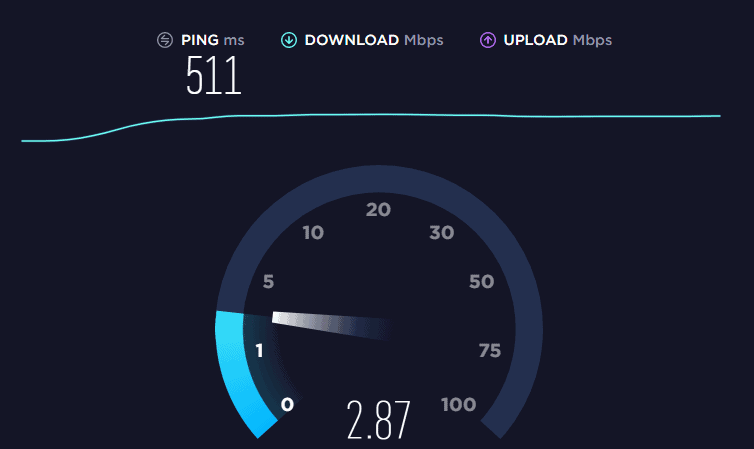
There is no correlation between the increase in ping time and distance. For example, the server in São Paulo, Brazil, which is approximately 5,788 miles from our test location, had a ping time of 735 ms. However, when we connected to the London server, which is 6,329 miles away, the ping time was 366 ms.
From the above results, we can deduce that while websites and online games will be slower to load, the lag will not necessarily increase with distance to the server.
We also noted a slight decrease (12 percent) in download speeds and a 26 percent drop in upload speeds. The download speeds were near-consistent across all servers. Even when connecting to longer-distance servers such as Australia and Netherlands, we experienced an insignificant drop in download speed. However, the upload speed varied widely, and in some cases, the dip was as big as 37 percent.
All in all, Mozilla VPN has decent speeds. It doesn’t add any significant complexity to your internet connection, and the speed cuts it for most internet activities. However, if you’re looking at a service for high-speed internet activities such as gaming or torrenting, be sure to check our list of fastest VPNs.
Security
Mozilla VPN is an open-source VPN with the slogan “Security you can rely on. A name you can trust.” This slogan promises a lot in terms of security, but does the VPN live up to it? We put it through rigorous DNS and WebRTC leak tests, and we were impressed.
Before we did the tests, we evaluated Mozilla VPN’s protocol and encryption — two critical aspects that form the foundation of a VPN’s security.
WireGuard Protocol
Mozilla VPN uses the WireGuard protocol, an open-source encryption protocol hailed as a game-changer in the VPN market. The protocol is lean (it’s written in just 4,000 lines of code) compared to more established protocols such as OpenVPN. As a result, WireGuard promises better speed and security than other protocols.
That said, WireGuard is relatively new and largely untested, and therefore could still have undiscovered security vulnerabilities. Also, having been around for a short period, WireGuard is yet to establish any kind of solid track record. However, its past is unblemished and being open-source, it’s subject to public scrutiny.
ChaCha20 and Poly1305 Encryption
Mozilla VPN doesn’t use 256-bit Advanced Encryption Standard (AES-256) encryption — the gold standard in VPN encryption. Instead, it combines the ChaCha20 cipher with the Poly1305 authenticator to create a secure tunnel for your data. ChaCha20 is a faster alternative to AES and in practical terms it’s just as secure.
However, the combination of ChaCha20 and Poly1305 is defined with 256-bit keys and delivers solid security. Moreover, ChaCha20 often performs better on mobile devices.
Dynamic IP Address
Mozilla VPN gave us a unique IP address every time we connected to a server — say London, UK. In other words, the VPN uses dynamic IP addresses, which is a good thing in terms of security. It means that every time you connect to a server, you don a new disguise, which goes a long way in keeping you secure and private online.
After running a series of tests, we found no IP, DNS or WebRTC leaks. The results didn’t catch us by any surprise, though. We expected the Mozilla VPN to breeze through our tests, given it utilizes WireGuard and combined encryption.
Privacy
The truth is, Mozilla has a reputation for creating products that keep user data safe. We’re glad Mozilla has created a short and to-the-point no-log policy to let users know where they stand on the digital privacy front. Mozilla claims to design the VPN “with your privacy in mind.”
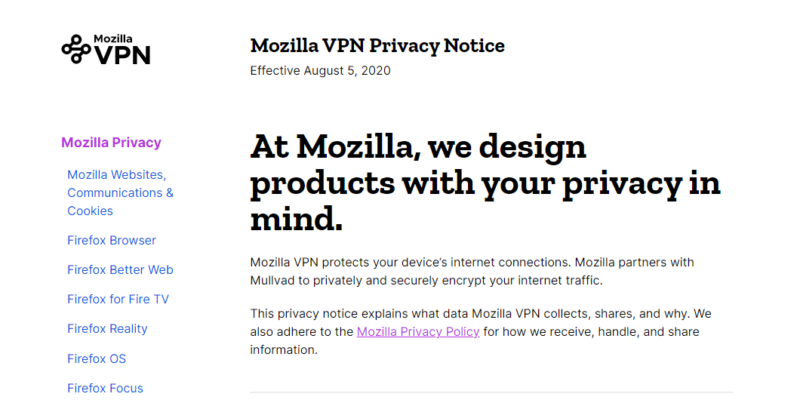
The promise sounds enticing, but is there sneaky small print in the Mozilla VPN privacy policy? As we combed through the policy, our attention was drawn to the information Mozilla collects, including:
- Your Firefox account information, like IP address and locale
- Which servers you use
- When you log in to your account and when you request the list of servers
- Your device’s hardware configuration and its operating system
The information it collects is more than privacy-conscious VPN users would willingly share. The good thing is Mozilla doesn’t log your web activity, at least as per the privacy policy.
Mozilla shares specific data with its two partners: Mullvad receives your internet traffic, whereas Stripe processes your payment information. Mullvad is one of the most privacy-focused services on the VPN market, so you can be sure it won’t keep your activity logs. You can check out Mullvad’s no-log policy to learn more.
On the other hand, Stripe is contractually obligated to protect your data and has a clean history. You can check Stripe’s comprehensive global privacy policy to learn more about them.
Can You Really Trust Mozilla?
You can trust Mozilla — the Firefox maker — as it is still way ahead of most of its competitors, and we like the sincerity and openness on the privacy policy. Mozilla has carved a good name regarding the way it handles user data.
Mozilla’s privacy jurisdiction is another reason to trust it. Although it’s in California, subject to the U.S.’s membership in the Five Eyes alliance, it’s also subject to California’s highly favorable online privacy laws.
The California Consumer Privacy Act (CCPA) gives businesses a strong legal defense if they dispose of customer data, and includes no provisions requiring data retention. As long as Mozilla is keeping its promise not to log user activity, it can’t be compelled to do so by the government.
Mozilla’s history leads us to believe that promise is valid, but we don’t have to take their word for it. In 2021, Mozilla VPN passed an audit by Cure53, which found nothing on Mozilla’s systems in violation of its privacy policy. So, yes, you can trust Mozilla VPN.
Streaming Performance
Mozilla VPN is designed with users who crave online security and privacy. Unfortunately this means there’s a lack of emphasis on features such as accessing geoblocked content. For this reason, we didn’t expect Mozilla VPN to deliver performance worth a place in our best VPN for streaming list.
We tried to use Mozilla VPN to stream content on video platforms such as Netflix, Amazon Prime Video and BBC iPlayer, and got mixed results.
We got off to a smooth start. Mozilla VPN accessed content on Netflix U.S. on the first attempt. The performance was impressive as we watched movies on Netflix U.S. in high resolution. The VPN was fast, but it’s not as fast as the product on our best VPN for Netflix list.
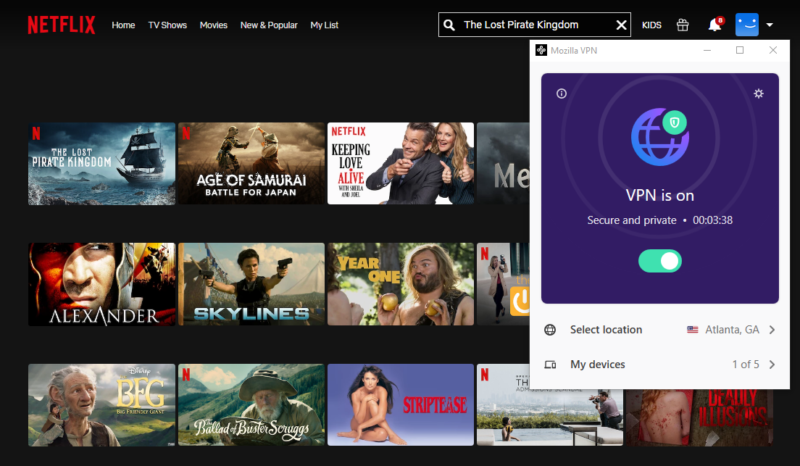
Beyond Netflix, we ran out of luck. We tried watching a movie on Amazon Prime Video and got the error “Your device is connected to the internet using a VPN or proxy service.” Clearly, Amazon Prime algorithms detected that we were using a VPN and blocked us. You can check our best VPN for Amazon Prime Video for the best alternative.
We quit the U.S. and travelled (virtually) to the UK to unlock British shows on BBC iPlayer. We logged into the streaming platform but couldn’t get past the first hurdle. As we expected, BBC iPlayer blocked us for not being in the correct country. If you want to get into BBC iPlayer with no issues, check our best VPN for BBC iPlayer list.
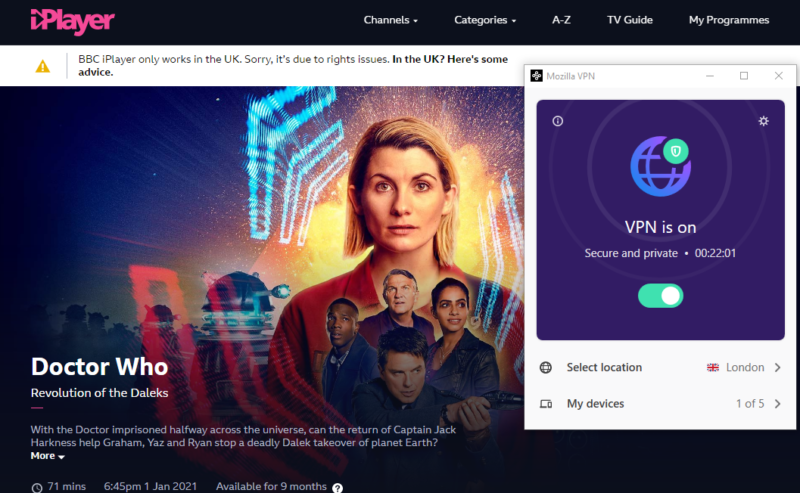
Server Locations
Mozilla VPN began life as Firefox Private Network — a VPN internet browser extension that utilized Cloudflare’s proxy servers. When the company finally decided to launch a stand-alone VPN, they switched to the P2P-friendly Mullvad servers.
It maintains a global network of over 500 servers, which is modest by the industry standards. The provider has strategically spread the servers across more than 45 locations in 31 countries worldwide. Europe has the most extensive server coverage, accounting for more than 20 countries.
It serves five countries in the Asia-Pacific regions, two in North America and one in South America. Beyond that, the provider completely overlooks Africa and countries with strict online censorship laws, such as Russia.
On a per-country basis, the United States has the most server locations, with servers in 12 cities. Besides the UK, Canada and Germany have servers in various cities, while each of the other countries has a server in one city.
Mozilla VPN’s server location options are unimpressive compared to industry leaders in this category, such as HideMyAss. You can head over to our HideMyAss review to learn about the VPN with an excellent geographic range of servers.
Customer Support
Mozilla is a highly reputed company, and judging by its caliber, we expected to contact customer support multiple ways. The available options, including a community forum, email support, social media support and online help center, partly met our expectations.
However, we were dismayed by the lack of live chat and that the service buried its phone support number (hidden away on Mozilla VPN’s Instagram page).
Getting help with Mozilla VPN starts with the “contact us” or “product help” pages. Fortunately, there is a way to directly get to these pages from within the Windows client, which makes the process friendlier.
We tested Mozilla VPN’s email support system, and we liked it. To create a ticket, we hopped over to the contact us page and completed the submission form.
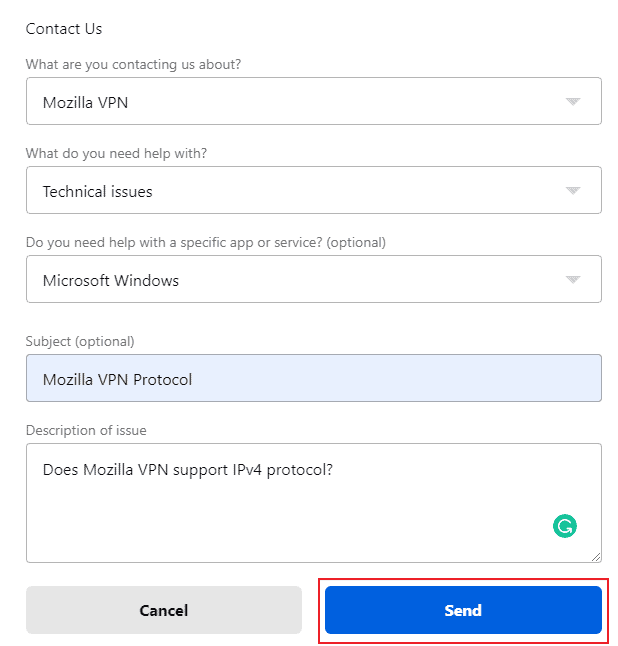
We received an automated ticket confirmation email within minutes, and the actual response took a little over six hours.
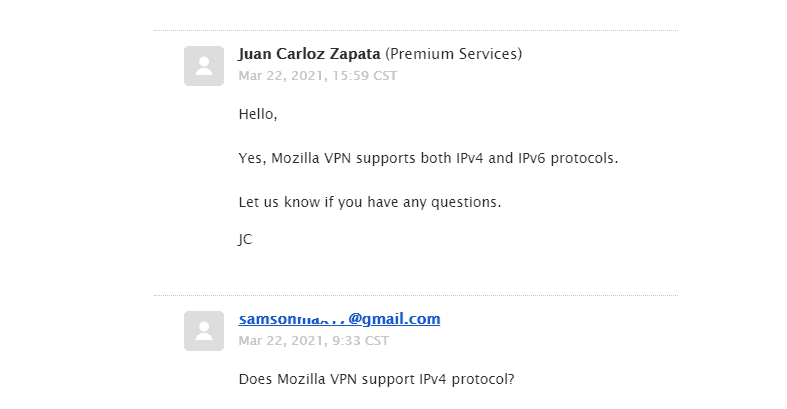
Though Mozilla is still so young, it has done an excellent job ensuring the self-service section has comprehensive yet easy-to-follow guides. The knowledgebase page has an extensive collection of articles divided into four categories: payments, technical, troubleshooting and accounts. The topics cover the most frequent issues you may have with the VPN.
All in all, customer support with Mozilla VPN is a great experience, even though the lack of live chat and phone support stings.
Final Verdict
Mozilla VPN looks promising — its features currently perform pretty well and it just exudes raw potential. The service has the makings of a great VPNs, including speed, ease of use, unlimited bandwidth, online security and customer support.
We hope the company will build on the early positives to realize this product’s full potential. To do so, Mozilla needs to work on the glaring negatives. For example, it is currently available only to users in the US, UK, Canada, New Zealand, Singapore and Malaysia. We would like to see Mozilla rolling out the VPN to users worldwide.
Some features, such as the kill switch, need a revamp, whereas split tunneling needs to be available on all apps. Plus, its monthly price is middle of the road, and we would like to have options to subscribe to longer (probably cheaper) plans. What’s more, Mozilla VPN needs to improve its global server coverage.
If you have had the opportunity to try Mozilla VPN, let us know what you think about the service in the comments. Would you recommend it to your friends? In which areas do you think Mozilla VPN excels? Thanks for reading.
FAQ
Yes, Mozilla VPN is good for low-speed and low-risk internet activities like web browsing, but steer clear of it if you plan on gaming with a VPN.
No, Mozilla VPN is not a free VPN.
Mozilla VPN costs $4.99 per month, and there are no annual or multi-year plans.
Yes, Mozilla VPN unblocks Netflix U.S. without any issues. It may not be the fastest VPN, but it allows you to watch movies and shows on Netflix without buffering.

